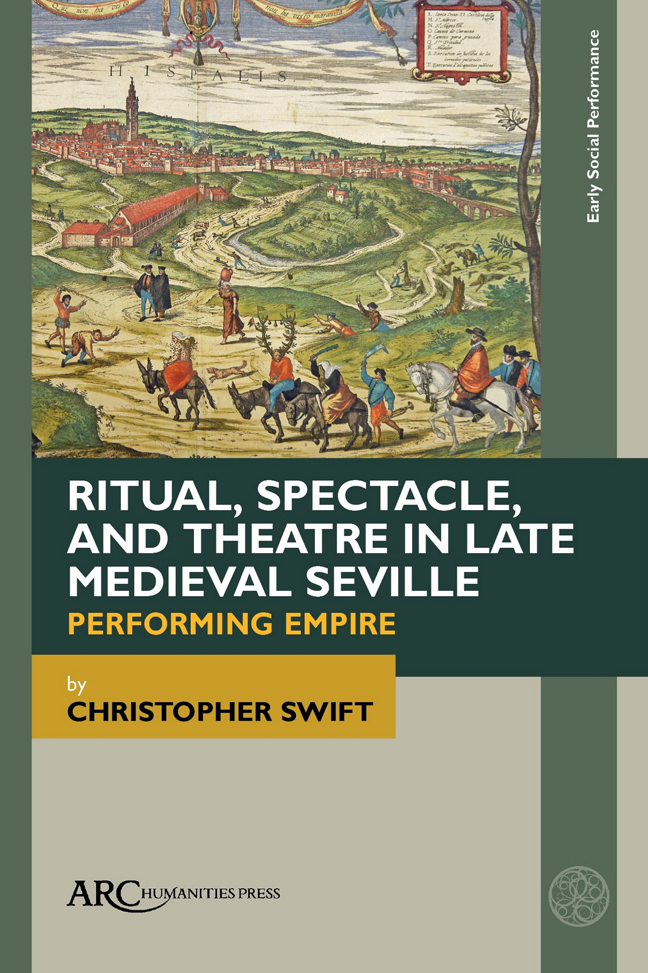Book contents
- Frontmatter
- Contents
- List of Illustrations
- Abbreviations
- Notes
- Acknowledgements
- Introduction. Theatres of Absence
- Chapter 1 The Cantigas de Santa Maria: Theatrical Acculturation of the Andalusi Colony
- Chapter 2 Penance, Conversion, and Affective Convivencia
- Chapter 3 Strange Infidels in the Imperial Metropole
- Conclusion. Walking Ghosts
- Bibliography
- Index
Chapter 3 - Strange Infidels in the Imperial Metropole
Published online by Cambridge University Press: 22 February 2024
- Frontmatter
- Contents
- List of Illustrations
- Abbreviations
- Notes
- Acknowledgements
- Introduction. Theatres of Absence
- Chapter 1 The Cantigas de Santa Maria: Theatrical Acculturation of the Andalusi Colony
- Chapter 2 Penance, Conversion, and Affective Convivencia
- Chapter 3 Strange Infidels in the Imperial Metropole
- Conclusion. Walking Ghosts
- Bibliography
- Index
Summary
Gold, with its mystical and eschatological connotations, is at the very heart of the religion of the Discoverer.
WHEN I WAS seven years old my family lived in Bergamo, Italy. One memory from that time is of my sister Sophie and me being processed around a schoolyard on the shoulders of the local children while they shouted “Cristoforo Colombo, Sophia Loren! Cristoforo Colombo, Sophia Loren!” The children were rejoicing to have Americans in their midst. I sensed, even at that early age, that this was their way of recognizing the Italian Americanness of Columbus and Loren, and by extension, the Americanness of the Italian children themselves. Having crossed the Atlantic, bearing the New World identities, Sophie and I completed the roundtrip journey of Columbus and Loren; we brought them home. The chants of the Bergamo children functioned within an historical imaginary that many schoolchildren learn from an early age: Columbus's “Discovery of America.” Their rehearsal of this notion in a ceremonial setting—a procession with song and invocation—was a way of raising Columbus from the dead, reanimating him in the body of a boy from the United States. This is nothing new. Theatricalization of transatlantic history of Discovery (parades, holidays, memorials, school plays) contribute to the invention and maintenance of European and American nationhood. Columbus discovering the Greater Antilles is no less plausible than the rediscovery of Columbus in annual festivals in the Americas. Both encounters involved performative imprimatur and restoration through the memory machine of theatre.
This chapter examines theatrical enactments and processions that promoted Spanish imperialism during the period of conquest and colonization of New Spain. First, I look at public spectacles imbued with themes of conquest and empire. The Feasts of Corpus Christi and Saints Days, royal entries, and processional translations of saints’ relics integrated an array of methods and symbols to projecting Spanish Christian pre-eminence and aggrandize the monarchy. Some of the tools used to theatrically project imperial themes included ancient Roman signs and figures, sacred objects with thaumaturgic powers, and exotic curios from the colonies. Imperial processionals like these were abundant in cities across Spain; however in Seville, the gateway to the Spanish Atlantic colonies, there was a special performative focus on protecting, strengthening, and celebrating the conquistadores, sailors, and noble families involved in transatlantic trade and enrichment. From what earlier traditions did the artisans and producers of imperial rituals draw from?
- Type
- Chapter
- Information
- Ritual, Spectacle, and Theatre in Late Medieval SevillePerforming Empire, pp. 127 - 164Publisher: Amsterdam University PressPrint publication year: 2023



